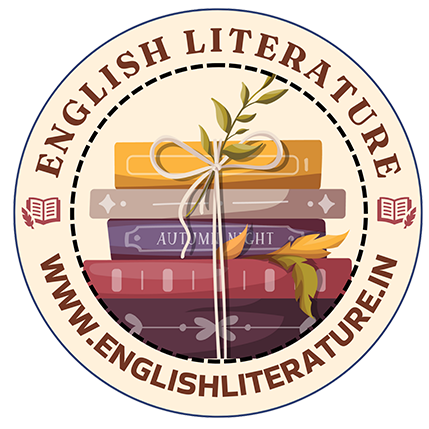A Journey Through Indian English Literature: Key Authors and Poets Across Eras
Table of Contents
ToggleEarly Period (Pre-Independence)
- Henry Louis Vivian Derozio (1809-1831):
- A pioneering poet and teacher, Derozio is known for inspiring the Bengal Renaissance. His poem The Harp of India reflects a blend of romanticism and patriotism.
- Michael Madhusudan Dutt (1824–1873):
- A key figure in the Bengali Renaissance, Dutt is famous for Meghanadavadha Kavya, an epic poem written in Bengali, and The Captive Ladie in English.
- Rabindranath Tagore (1861–1941):
- The first non-European to win the Nobel Prize in Literature (1913) for Gitanjali. His works combine lyrical beauty with deep philosophical insights, including his famous poem Where the Mind is Without Fear.
- Sri Aurobindo (1872–1950):
- A philosopher, yogi, and poet, Sri Aurobindo’s epic Savitri is considered a masterpiece of Indian spiritual poetry. His other works include The Life Divine and Essays on the Gita.
- Sarojini Naidu (1879–1949):
- Known for her lyrical poetry, Naidu wrote extensively on Indian culture and independence. Her works include The Golden Threshold and The Bird of Time.
- R. K. Narayan (1906–2001):
- A pioneering novelist known for his creation of the fictional South Indian town of Malgudi. His novels, such as The Guide and Swami and Friends, depict the complexities of Indian middle-class life.
- Mulk Raj Anand (1905–2004):
- One of the founding fathers of Indian English literature. His novels, such as Untouchable and Coolie, tackle the issues of caste and class oppression.
- Ahmed Ali (1910–1994):
- Best known for Twilight in Delhi, Ali was an early writer of modern Indian English fiction, exploring the impact of colonialism on Indian society.
- Khushwant Singh (1915–2014):
- Renowned for his novel Train to Pakistan, which explores the horrors of the Partition of India. Singh also contributed to Indian journalism and short story writing.
Post-Independence (Modern Era)
- Nissim Ezekiel (1924–2004):
- Widely regarded as the father of modern Indian English poetry, Ezekiel’s works like The Unfinished Man reflect urban themes, existential concerns, and Indian identity.
- Kamala Das (1934–2009):
- Known for her confessional style, Kamala Das’s My Story and poems like An Introduction challenge societal norms and explore themes of love, desire, and identity.
- R. Parthasarathy (born 1934):
- Poet and translator, his collection Rough Passage deals with the conflicts between Indian tradition and modernity.
- Rohinton Mistry (born 1952):
- Known for his novels like A Fine Balance and Such a Long Journey, Mistry writes about the Parsi community and postcolonial India with a focus on social and political issues.
- Vikram Seth (born 1952):
- Acclaimed for his novel A Suitable Boy, Seth also wrote The Golden Gate, a novel in verse, and Mappings, a collection of poetry.
- Arundhati Roy (born 1961):
- Won the Booker Prize for The God of Small Things, a novel that explores family dynamics and the caste system in Kerala. Roy is also a political activist.
- Amitav Ghosh (born 1956):
- A renowned novelist and essayist, Ghosh’s The Ibis Trilogy explores colonialism, migration, and the opium trade. His other notable works include The Shadow Lines.
- Jeet Thayil (born 1959):
- A poet and novelist, Thayil’s Narcopolis was shortlisted for the Booker Prize. He is also known for his collections of poetry like These Errors are Correct.
- Keki N. Daruwalla (born 1937):
- A prominent poet and short story writer, Daruwalla’s works such as The Keeper of the Dead have won him accolades like the Sahitya Akademi Award.
- Shashi Tharoor (born 1956):
- An author, politician, and diplomat, Tharoor’s novels like The Great Indian Novel and Riot explore Indian history, culture, and identity through satirical and humorous lenses.
- Salman Rushdie (born 1947):
- Though often associated with British literature, Rushdie’s Midnight’s Children, which won the Booker Prize, explores the history of modern India through magical realism. The Satanic Verses is another controversial yet influential work.
- Anita Desai (born 1937):
- Known for her novels like Clear Light of Day and In Custody, Desai’s works explore the emotional and psychological complexities of Indian middle-class life.
- Kiran Desai (born 1971):
- Daughter of Anita Desai, Kiran won the Man Booker Prize for The Inheritance of Loss, a novel that delves into postcolonial themes of migration and identity.
- Chetan Bhagat (born 1974):
- Known for his popular fiction, Bhagat’s novels like Five Point Someone and 2 States focus on contemporary urban life and youth culture in India.
- Meena Alexander (1951–2018):
- A poet and scholar, Alexander’s works like Fault Lines and Illiterate Heart explore themes of migration, identity, and belonging.
- Arundhathi Subramaniam:
- A contemporary poet whose collection When God is a Traveller has garnered critical acclaim for its spiritual and personal reflections.
Additional Influential Writers & Poets
- Raja Rao (1908–2006):
- His novel Kanthapura is a pioneering work of Indian English fiction, blending Indian oral traditions with the narrative form.
- Manohar Malgonkar (1913–2010):
- An author of novels, short stories, and historical works, Malgonkar’s The Princes and A Bend in the Ganges offer rich insights into India’s history and social changes.
- Gieve Patel (born 1940):
- A poet, playwright, and painter, Patel’s works like Poems and On Killing a Tree reflect his concerns with nature, politics, and human suffering.
- A.K. Ramanujan (1929–1993):
- A bilingual poet and translator, Ramanujan is known for his collections like The Striders, as well as for his translations of ancient Tamil and Kannada poetry.
- Jayanta Mahapatra (born 1928):
- A major figure in Indian English poetry, Mahapatra’s Relationship and A Rain of Rites reflect his deep connection with Indian culture and history.
This expanded list covers a broader range of authors and poets who have significantly contributed to Indian English literature across different eras. Their works span diverse themes such as colonialism, postcolonialism, identity, social justice, and spirituality.
